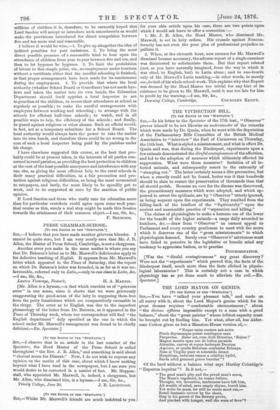THE VIVISECTION BILL.
[To THE EDITOR OF THE "SPECTATOR."] SIR,—In his letter to the Spectator of the 17th inst., "Observer"' proves himself to be not likewise an understander of the remarks which were made by Dr. Quain, when he went with the deputation of the Parliamentary Bills Committee of the British Medical Association to " interview " the Earl of Carnarvon on Thursday, the 15th inst. What is styled a misstatement, and what in effect Dr. Quain said was, that during the Rinderpest, experiments upon a few animals demonstrated the direful contagiousness of the affection, and led to the adoption of measures which ultimately effected its suppression. What were those measures ? Isolation of all in- fected animals, and subsequently resort to the extremity of " stamping out." The latter certainly seems a dire preventive, but when a remedy could not be found, better was it that hundreds should be slain to ensure the preservation of thousands than that all should perish. Because no cure for the disease was discovered, the precautionary measures which were adopted, and which ap- peared to arrest the epidemic, are by " Observer" utterly ignored, as being sequent upon the experiments. They resulted from the- falling-back of the intellect of the "Squirearchy" upon the ancient and unscientific practice of "separation and killing."
The claims of physiologists to make a humane use of the lower- for the benefit of the higher animals—a usage daily accorded to butchers, &c.—draw from " Observer " an earnest appeal to Parliament and every country gentleman to meet with the scorn which it deserves one of the "gross misstatements" to which physiologists descend. Surely even " Observer's" astuteness must have failed to perceive in the legislative or bucolic mind any tendency to appreciate bathos, or to practise
DISCRIMINATION.
[Was the "direful contagiousness" any great discovery?' Were not the " experiments " which proved this, the facts of the Rinderpest itself, much more than the facts elicited in physio- logical laboratories ? This is certainly not a case in which physiology has as yet done much to alleviate the evil.—En.. Spectator.]
































 Previous page
Previous page